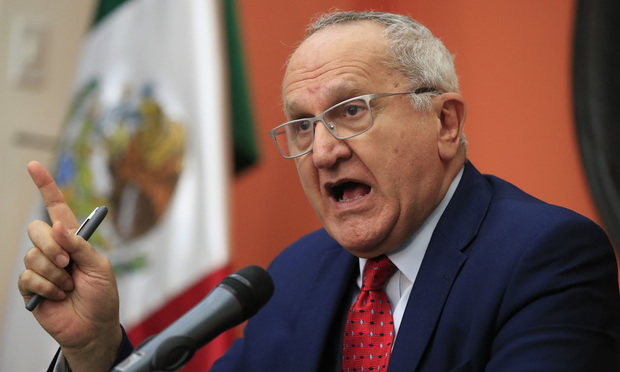Mexico Optimistic for US Vote on USMCA Trade Deal in Coming Weeks
Officials have worked overtime to convince U.S. Democrats and unions that Mexico is serious about improving labor rights and lifting wages.
October 25, 2019 at 05:01 PM
4 minute read
 Jesus Seade, Mexico's deputy foreign minister for North America. AP Photo: Manuel Balce Ceneta
Jesus Seade, Mexico's deputy foreign minister for North America. AP Photo: Manuel Balce Ceneta
After months of arduous talks, Mexico's chief trade negotiator says he believes U.S. legislators could be headed for a vote on the U.S.-Mexico-Canada trade deal in the coming weeks.
Jesús Seade, Mexico's deputy foreign minister for North America, stood alongside the Mexican President on Friday to dispel concerns about the treaty and lay out all the work officials like him have done to convince organised labour and legislators in the U.S. that Mexico is committed to improving labour rights and raising wages.
"We think the end of this complex history is near and that soon we will see the United States initiate a formal approval process for the accord… in a few weeks," said Seade.
In early October, Mexico received a visit from House Ways and Means chairman Richard Neal, who was concerned that Mexico was not allocating sufficient funds to fulfil its commitments under the labour reform approved this year.
Mexican President Andrés Manuel López Obrador sent Neal a followup letter after the visit, assuring him that "our government supports this labour policy out of its own conviction".
If not approved this year, the trade agreement could get pushed to the back burner as the 2020 U.S. presidential election nears.
Mexican officials feel that, while not ideal, the country could live with the terms of the existing North American Free Trade Agreement, which U.S. President Donald Trump threatened to cancel even before he took office.
Mexico's $1.2 trillion manufacturing-heavy economy is highly dependent on the U.S. market, which absorbs more than 80% of the country's exports.
López Obrador emphasised on Friday that Mexico remains an attractive place for foreign investment. This is due to its extensive trade agreements but also its strategic geographic location and large economy with 120 million consumers.
Seeing increased opportunities, global law firms are keen to expand in Mexico even as its preferential trade status with the U.S. is in question.
Andersen Global chairman Mark Vorsatz said his firm is in talks to add lawyers in Mexico, a country he sees as "key" in Latin America because it's home to many corporate headquarters. Andersen has undertaken an ambitious global expansion in recent months via collaboration agreements with local firms in dozens of countries.
Mexican officials said they are committed to collective bargaining and secret union votes under the current progressive government, which took control of Mexico's congress and the presidency in 2018, as well as to lifting wages.
"We are transitioning from a system of total corporate management of the labour issue to a free system of authentic negotiation," said Seade.
Mexican businesses have long appointed union bosses known as 'charros' – or cowboys – who protect owners' interests without real support from workers. Many blame the charros for suppressing wages. About 13% of salaried workers in Mexico are represented by unions.
Now, even Mexican business chambers concede that wages need to rise above a monthly average of $315 nationwide.
Seade sees "national consensus" for better wages in Mexico, with different corners acknowledging that repressed salaries are not only unfair, but also hurt the economy by reducing the buying power of consumers.
But Mexico still has had to convince the U.S. that it is serious about improving wages and labour rights. "I think we have gone far enough to say we now understand each other and let's turn the page," Seade said of his outreach to U.S. Democrats and labour representatives.
"If there ends up being no treaty, it's because the two main political parties of the United States have not reached an understanding," Seade said, noting that both parties recognise that Mexico has been "a positive partner that has negotiated in good faith".
This content has been archived. It is available through our partners, LexisNexis® and Bloomberg Law.
To view this content, please continue to their sites.
Not a Lexis Subscriber?
Subscribe Now
Not a Bloomberg Law Subscriber?
Subscribe Now
NOT FOR REPRINT
© 2025 ALM Global, LLC, All Rights Reserved. Request academic re-use from www.copyright.com. All other uses, submit a request to [email protected]. For more information visit Asset & Logo Licensing.
You Might Like
View All
KWM Adds Three New Partners in Singapore and Australia

Whistleblowing in 2025: What's on the Horizon for GCs?

Quartet Of Firms Secure Roles as LG Group’s IT Services Arm Lists for $823M
Trending Stories
- 1People in the News—Feb. 6, 2025—Unruh Turner, Fox Rothschild
- 2‘Listen, Listen, Listen’: Practice Tips From Judges in the Oakland Federal Courthouse
- 3Gertrude Stein Is Right On Again
- 4Georgia's Next Judge? Sole Candidate Shortlisted to Rise to Bench
- 5The End of Innocence? DEP’s End Run Around ‘All Appropriate Inquiry’ Spill Act Protections
Who Got The Work
J. Brugh Lower of Gibbons has entered an appearance for industrial equipment supplier Devco Corporation in a pending trademark infringement lawsuit. The suit, accusing the defendant of selling knock-off Graco products, was filed Dec. 18 in New Jersey District Court by Rivkin Radler on behalf of Graco Inc. and Graco Minnesota. The case, assigned to U.S. District Judge Zahid N. Quraishi, is 3:24-cv-11294, Graco Inc. et al v. Devco Corporation.
Who Got The Work
Rebecca Maller-Stein and Kent A. Yalowitz of Arnold & Porter Kaye Scholer have entered their appearances for Hanaco Venture Capital and its executives, Lior Prosor and David Frankel, in a pending securities lawsuit. The action, filed on Dec. 24 in New York Southern District Court by Zell, Aron & Co. on behalf of Goldeneye Advisors, accuses the defendants of negligently and fraudulently managing the plaintiff's $1 million investment. The case, assigned to U.S. District Judge Vernon S. Broderick, is 1:24-cv-09918, Goldeneye Advisors, LLC v. Hanaco Venture Capital, Ltd. et al.
Who Got The Work
Attorneys from A&O Shearman has stepped in as defense counsel for Toronto-Dominion Bank and other defendants in a pending securities class action. The suit, filed Dec. 11 in New York Southern District Court by Bleichmar Fonti & Auld, accuses the defendants of concealing the bank's 'pervasive' deficiencies in regards to its compliance with the Bank Secrecy Act and the quality of its anti-money laundering controls. The case, assigned to U.S. District Judge Arun Subramanian, is 1:24-cv-09445, Gonzalez v. The Toronto-Dominion Bank et al.
Who Got The Work
Crown Castle International, a Pennsylvania company providing shared communications infrastructure, has turned to Luke D. Wolf of Gordon Rees Scully Mansukhani to fend off a pending breach-of-contract lawsuit. The court action, filed Nov. 25 in Michigan Eastern District Court by Hooper Hathaway PC on behalf of The Town Residences LLC, accuses Crown Castle of failing to transfer approximately $30,000 in utility payments from T-Mobile in breach of a roof-top lease and assignment agreement. The case, assigned to U.S. District Judge Susan K. Declercq, is 2:24-cv-13131, The Town Residences LLC v. T-Mobile US, Inc. et al.
Who Got The Work
Wilfred P. Coronato and Daniel M. Schwartz of McCarter & English have stepped in as defense counsel to Electrolux Home Products Inc. in a pending product liability lawsuit. The court action, filed Nov. 26 in New York Eastern District Court by Poulos Lopiccolo PC and Nagel Rice LLP on behalf of David Stern, alleges that the defendant's refrigerators’ drawers and shelving repeatedly break and fall apart within months after purchase. The case, assigned to U.S. District Judge Joan M. Azrack, is 2:24-cv-08204, Stern v. Electrolux Home Products, Inc.
Featured Firms
Law Offices of Gary Martin Hays & Associates, P.C.
(470) 294-1674
Law Offices of Mark E. Salomone
(857) 444-6468
Smith & Hassler
(713) 739-1250









